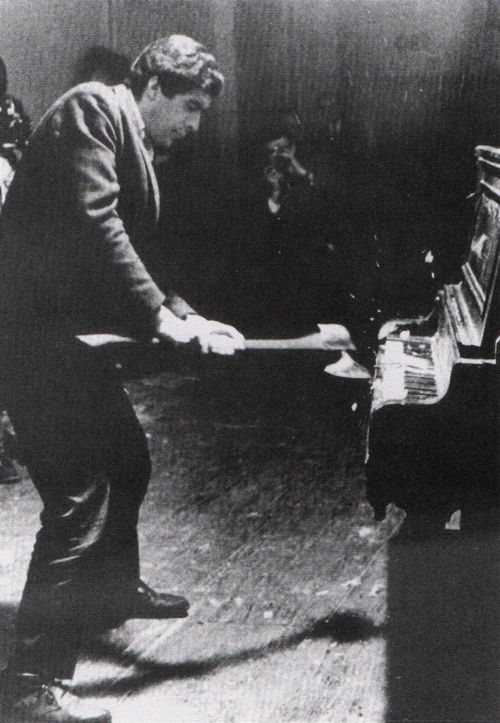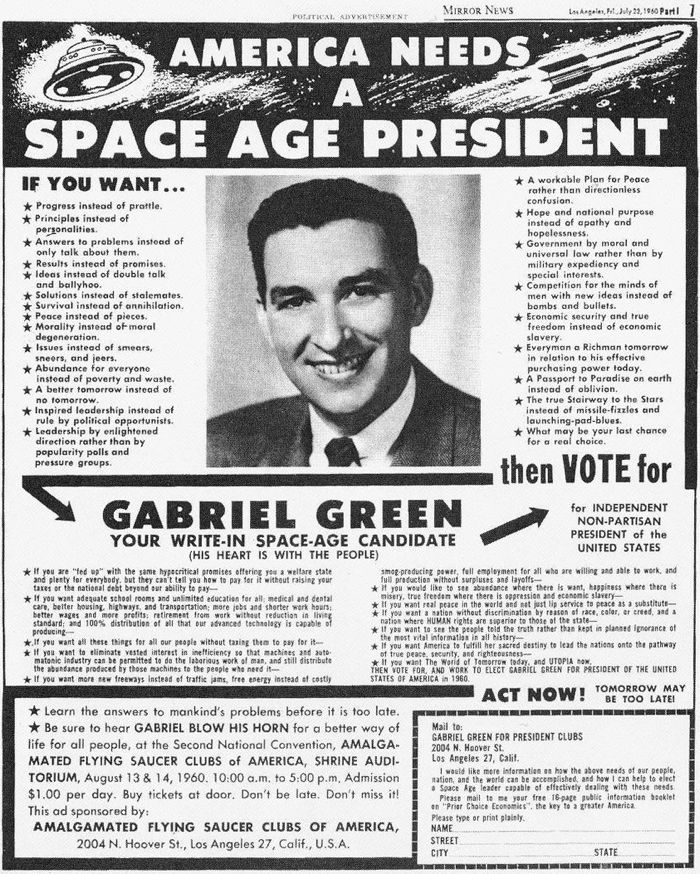1960s
The Bathtub by Bob Reisner (1969)
If you couldn't have the real thing, you could always get the model kit.

The kit assembled at this site.
Posted By: Paul - Fri Nov 18, 2016 -
Comments (5)
Category: Beauty, Ugliness and Other Aesthetic Issues, Eccentrics, 1960s, Cars
Destructivist Art
In September 1966, the first ever "Destruction in Art Symposium" was held in London, highlighting the work of the self-styled Destructivists. Basically, they destroyed things and called it art.LA Times staff writer Robert Toth delivered the following report from the Symposium (LA Times - Sep 11, 1966):
But to justify slaughter of a flock of chickens, more pretentious words are demanded. Said one abortive chicken killer, Ralph Ortiz:
"Destructivist art gives our destructive instinct its essential expression while coming to terms with destruction's most primitive maladaptive aspects — aspects that ordinarily would prove to work for the destruction of the species rather than its survival."
After those words, which seem to mean emotional release for him, the American "artist" looked absurd when the law intervened to prevent the massacre (which, incidentally, was to have bloodied 10 elegantly tuxedoed men as an added attraction).
Ortiz came up with a lone canary but no, not that either, said the RSPCA inspector.
Could he let the bird out the window? No again, for it was a cold night.
The frustrated Ortiz settled for showing a film of a chicken-killing, but not before the coup de grace was administered.
Why not stomp a caterpillar, suggested an onlooker. "I'm not a caterpillar-killer," huffed the affronted artist.
His less ambitious colleagues have fared better. One broke a chair to smithereens. Another created a hole with an ordinary shovel, and promptly priced it at $350.
Ortiz did, however, help axe a piano apart.
In 1996, Raphael Ortiz (he was no longer calling himself Ralph) re-enacted his piano-axing performance at New York's Whitney Museum of American Art... but with one small change. According to NY Times critic Michael Kimmelman, he was now accompanied by "a woman in pigtails and ruffled apron standing on a ladder dropping eggs into a bucket and chanting Humpty Dumpty."

Ralph Ortiz destroying a piano — 1966
Incidentally, literary critic Robert Grossmith has noted that one of the reasons for the obscurity of the Destructivist Art movement is that "not a single Destructivist work of art exists. There are no primary sources. Not a solitary Destructivist novel, poem, play, story, painting, sculpture, film, dance or piece of music was ever produced or, if produced, allowed to survive. In fact if a Destructivist work of art was to turn up today, its very existence would automatically disqualify it from being considered as genuinely Destructivist. There can in short never be a Destructivist work of art, in any accepted sense of the word ‘be’."
Posted By: Alex - Thu Nov 17, 2016 -
Comments (9)
Category: Art, Performance Art, 1960s
The Connection
Unless you're a film buff you probably haven't heard of Shirley Clarke's 1961 movie The Connection. It was an experimental film, purporting to be actual footage of a group of heroin junkies waiting in an apartment for their dealer ("the connection") to show up. Though, of course, the supposed junkies were all actors, and the film was scripted.But the movie's real claim to fame is that it was the first American film to ever use the word "shit." From wikipedia:
The case went all the way to the New York State Court of Appeals (the state's highest court). The Court of Appeals affirmed the decision of the intermediate level Appellate Division, which had held that while 'vulgar', this usage could not be considered obscene. Ultimately, the film was not a success at the box office.
The trailer:
The full film:
Posted By: Alex - Tue Nov 15, 2016 -
Comments (1)
Category: Movies, 1960s, Curses, Slurs, Insults, Vituperation, Libel and Slander
Fashion 2000
Interestingly, I think the predictions from farther away from the year 2000 were a bit more accurate than those that were closer!
Posted By: Paul - Tue Nov 15, 2016 -
Comments (1)
Category: Fashion, Futurism, 1930s, 1960s, Twenty-first Century
America needs a space age president
Gabriel Green campaigned to be President of the United States in 1960, promoting himself as "your write-in space-age candidate."His main qualification was that he had "seen at least 75 flying saucers and has chatted with space people." Also, he was founder of the Amalgamated Flying Saucer Clubs of America. He promised that his presidency would usher in "The World of Tomorrow, and UTOPIA now."
However, he didn't attract a lot of support from voters. He attributed this to the fact that "not enough Americans have yet seen flying saucers or talked to outer space people." So he dropped out of the race and endorsed John F. Kennedy. The space people told him that they approved his decision.
He ran again in 1972, with similar results.
More info (and photos) at Gabriel Green for President.

Posted By: Alex - Tue Nov 08, 2016 -
Comments (6)
Category: Politics, Strange Candidates, 1960s
Kenner’s Scottie Bagpipe
Introduced by Kenner in 1962, this plaid-patterned vinyl bag attached to a plastic flute allowed kids to play "exciting bagpipe effects." You need to watch the short video to appreciate the true horror of the sounds this thing created. Guaranteed to drive parents insane in mere seconds.


Posted By: Alex - Mon Nov 07, 2016 -
Comments (7)
Category: Music, Toys, 1960s
Electromechanical Arcade Games
Barring pinball and skeeball, how did primitive youngsters amuse themselves in arcades before computer-chip video games?With electromechanical games.
As in the videos below.
Posted By: Paul - Sun Nov 06, 2016 -
Comments (2)
Category: Technology, 1960s, 1970s, Videogames and Gamers
Let’s Say It Right
In October 1969, the U.S. Command in Vietnam issued a directive titled "Let's Say it Right" to the American Forces Vietnam Network (AFVN). The directive forbid military press officers from using certain terms and provided a list of acceptable terms in their place.For instance, instead of referring to "free firing zones" in which anything that moved was considered enemy and could be fired at, officers were supposed to say "pre-cleared firing zones." And instead of "lull" they were supposed to refer to "light and scattered action."
A military spokesman said that the directive was actually just a "style sheet" whose purpose was to "get everyone using similar words."
Some more of the "no-no" words (as AFVN officers described them) were listed in this NY Times piece:

New York Times - Jan 11, 1970

GI Press Service - April 1971
Posted By: Alex - Fri Nov 04, 2016 -
Comments (5)
Category: Languages, Military, 1960s
Follies of the Madmen #295
So that's where corporate executives come from! It's something in their breakfast cereal as kids!
Posted By: Paul - Tue Nov 01, 2016 -
Comments (5)
Category: Business, Advertising, Products, Food, Children, 1960s
Post Toasties
Here's an ad campaign over the course of a decade or so that shows the Mad Men flailing around blindly. Whom do we appeal to? Kings, Indian Chiefs, housewives, nursery-rhyme characters, despotic sea captains, or cartoon animals? Or, in the end, the anti-hippie conservatives embodied by Andy Griffith and his fancy-neckwear disparagement?
Posted By: Paul - Sun Oct 30, 2016 -
Comments (2)
Category: Business, Advertising, Food, 1950s, 1960s

| Who We Are |
|---|
| Alex Boese Alex is the creator and curator of the Museum of Hoaxes. He's also the author of various weird, non-fiction, science-themed books such as Elephants on Acid and Psychedelic Apes. Paul Di Filippo Paul has been paid to put weird ideas into fictional form for over thirty years, in his career as a noted science fiction writer. He has recently begun blogging on many curious topics with three fellow writers at The Inferior 4+1. Contact Us |




